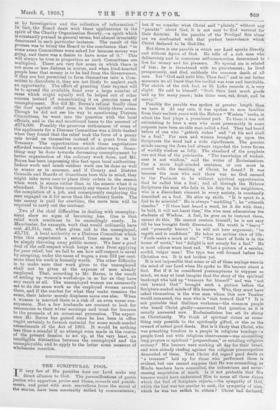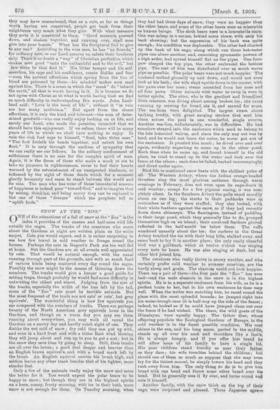THE SCRIPTURAL FOOL.
IN very few of His parables does our' Lord make any direct allusion to God. The personifications of poetio justice who apportion praise and blame, rewards and punish- ments, and point with such marvellous force the moral of the stories, have been constantly deified by commentators; but if we consider what Christ said "plainly," without any "parable" about God, it is not easy to find warrant for their doctrine. In the parable of the Prodigal Son alone. are we confronted with that perfect benevolence which' Christ declared to be God-like.
But there is one parable in which our Lord speaks directly and without figure of God. He tells of a rich man who deliberately and in conscious self-communion determined to live for money and for pleasure. No special sin is related of him ; be is threatened with no punishment; he lived prosperously, and died suddenly the common death of all men. Yet "God said unto him, Thou fool," and in our better moments we all know that the verdict was true and inevitable. The sketch of the rich fool, as St. Luke records it, is very slight. He said to himself : thou bast much goods laid up for many years ; take thine ease, eat, drink, and be merry."
Possibly the parable was spoken at greater length than we have it. At any rate, it was spoken to men familiar from their earliest years with the Hebrew " Wisdom" books, in which the fool plays a prominent part. To them it was not astonishing to hear a man who must presumably in some .respects have been an able man called a fool. They had heard before of one who " getteth riches " and " at his end shall be a fool." For men and women brought up upon the. Scriptures the word had a wide significance. The greater. minds among the Jews had always regarded the lower forms of worldly wisdom as folly. The standard of the prophets was not that of the patriarchs. "The knowledge of wicked-, ness is not wisdom," said the writer of Ecclesiasticus. Can a more high-minded sentence, or one more in. accord with the teaching of Christ, be found P It was because the man who said there was no God seemed to the Psalmist to be without spiritual apprehension that he called him a fool ; and all through the Hebrew Scriptures the man who fails in his duty to his neighbours,, who is a discordant element in every society, is constantly described as a fooL He stirs up strife. "It is sport to a fool to do mischief." He is always " meddling"; he " uttereth. slander." "If thou bust heard a word, let it die with thee ; be bold, it will not burst thee," the wise man admonishes the students of Wisdom. A fool, he goes on to instruct them, cannot do this. He cannot contain himself; he is not easy till he has brought forth dissension. His wrath is " heavy " and "presently known"; he will not bear argument; "he rageth and is confident." He takes no serious view of life: "Fools make a mock at sin." " The heart of fools is in the house of mirth," but " delight is not seemly for a fool." He is most odious when least sad. What, a picture of a secular,' sordid, vulgar man ! The type was well formed before the Christian era. It is not broken yet.
It is not impossible that some or all of these sayings were in the mind of our Lord when He spoke to His hearers about a fool. But if it be considered presumptuous to suppose so much, we may at least imagine that the story of the spiritual bankrupt who laid up "treasure for himself" and was "not rich toward God " brought such a picture before the, Scripture-soaked minds of His hearers. Who, they must have asked themselves, is the wise man whom this new TeaCher, would commend, the man who is "rich toward God " P It is not probable that Galilean workmen—the common people who beard Christ gladly—answered that question as it is usually answered now. Ecclesiasticism has set its stamp on Christianity. We think of spiritual riches as some- thing only possible to the spiritually gifted, or else as the reward of actual good deeds. But is it likely that Christ, who was preaching freedom to a people in religious bondage—a people tired out with religious observances—was counselling long prayers or spiritual " preparations," or extolling religious ecstasy P His hearers were working all day for their bread, and were already chafing against the religious preoccupation demanded of them. That Christ did regard good deeds as " a treasure" laid up for those who performed them is evident, but one cannot suppose that He was counselling, as Hindu teachers have counselled, the industrious and never-' ceasing acquisition of merit. Is it not probable that His hearers would have understood Him to mean all those riches which the fool of Scripture rejects,—the sympathy of God,'
which the fool was too secular to seek, the sympathy of man,' Which he was too selfish to obtain P Christ had declared, they may have remembered, that as a rule, so far as things Worth haying are concerned, people get back from thole neighbours very much what they give. With what measure they mete it is measured to them. " Good measure, pressed down, and shaken together, and running over, shall men give into ypur bosom," What has the Scriptural fool to give to any one P According to the wise men, he has "no friends," for ordinary men, as our Lord assures us, salute their brethren gnly. There is no doubt a "way" of Christian perfection which 'makes men good "unto the unthankful and to the evil," but few there be that find ib." His bitter temper and his self- assertion, his rage and his confidence, create dislike and fear —even the natural affections which spring from the tics of blood are poisoned by them--his mischief makes men mad against him. There is a sense in which the "meek" do "inherit the earth," all that is worth having in it, It is because we do not agree with Christ as to what is worth having that we find so much difficulty in understanding His words. John Lack- land said : "Love is the leech of life" ; without it "in vain are her many medioin,is." But apart from the closer affections, it is only the kind and tolerant—the men of deter- mined goodwill—who can really enjoy looking on at life, and surely our Lord, who made the parables, intended that we should have this enjoyment. If we refuse, there will be many years of life in which we shall have nothing to enjoy. In vain the rich fool says to himself, " Soul, take thine ease." " The fool foldeth his hands together, and eateth his own flesh." It is only through the medium of sympathy that We can really see our fellows. In the solitary confinement of selfishness there is no ease for the complex spirit of man. Again, it is the doom of those who make a mock at sin to take no pleasure in righteousness, never to feel their hearts warmed by the astonishment of an unexpected kindness, or inflamed by the sight of those deeds which for a moment glorify humanity and seem to stand between the world and its sins. The man who has none of these immaterial sources of happiness is indeed poor " toward God," and to imagine that by eating, drinking, and being merry they can be replaced is but one of those " dreams " which the prophets tell us " uplift fools."















































 Previous page
Previous page